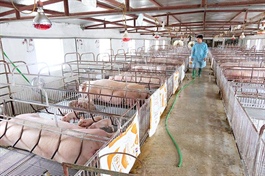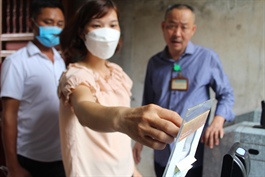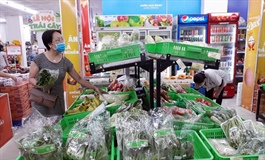New criteria for OCOPs
New criteria for OCOPs
The Government has introduced a new set of criteria for rating products enrolling in the One Commune One Product (OCOP) Programme.

Dao Duc Huan, head of the OCOP Management Department, Central Coordination Office for New-style Rural Development (CCO), said the new set was laid down to replace the old set issued in 2019, which has begun to show cracks after four years being in place.
As the old set had overlooked a wide range of products specified in Decision No.490, the new one has fixed the cracks by expanding its scope to cover the missing pieces.
It has also altered old scoring rules by assigning a maximum score of 40 points to the "community strength" category, 25 points to "marketing capabilities", and 35 points to "product quality".
Huan said the new set had encouraged the involvement of women and ethnic minorities in the production of OCOPs by giving extra points to affirmative actions. It has also encouraged the use of local materials and labour by adding around one to five points to localisation efforts.
A fair amount of paperwork involved in the application process has been cut. Applicants for OCOP ratings now just have to submit a self-assessment report to the panel of judges to have their products evaluated.
As ratings have become lenient in some localities recently, the Government has righted the wrong by taking charge of evaluating five-star OCOPs. It devolved four-star products to provincial authorities and three-star to municipal ones.
CCO Deputy Chief Phuong Dinh Anh believed that the delegation of authority would reduce the workloads of province-level panels and allow district-level authorities to play an active role in supporting their local OCOPs.
"The decentralisation of authority would allow local authorities to support their local OCOPs more actively," said Anh.
He also said 8,689 OCOPs had been scored by late 2022, with 65.5 per cent of the products being labeled three-star, 33.6 per cent four-star, 0.7 per cent potential five-star, and 0.2 per cent five-star.
Vu Ba Phu, director of the Trade Promotion Agency, Ministry of Industry and Trade, said his agency had been working since 2018 to help OCOPs carve out a niche in the global market.
Last year, the agency organised scores of business-matching events across the country to link OCOP producers with traders and exporters. It also engaged in many information-sharing activities to keep them well-informed about foreign standards.
Training courses have been implemented to help the producers get used to e-commerce platforms, which, he believes, would hold the key to their transborder commercial success.
On the downside, the director underlined three obstacles in the way of producers trying to develop trade overseas.
The first obstacle centres around their production scale. As most OCOP producers are small in size, they are producing on a scale far from being adequate for international trade.
For example, if a foreign supermarket chain accepts an OCOP, it would require at least several containers of the product to be supplied monthly. For a local producer, several containers per month would be beyond their capabilities.
The second obstacle involves their product uniformity. OCOP producers normally do not have a sound quality management system, which is essential for quality consistency. Non-uniformity has barred many OCOPs from entering foreign markets.
The last obstacle is their low awareness of country-specific labeling and packaging requirements. The awareness is even lower in rural areas where producers face more difficulties staying au courant.
The director said his agency would push ahead with trade promotion and training programmes in the short term to help the producers overcome those obstacles. The programmes would be designed in a way that each is tailor-made for a particular OCOP.

























